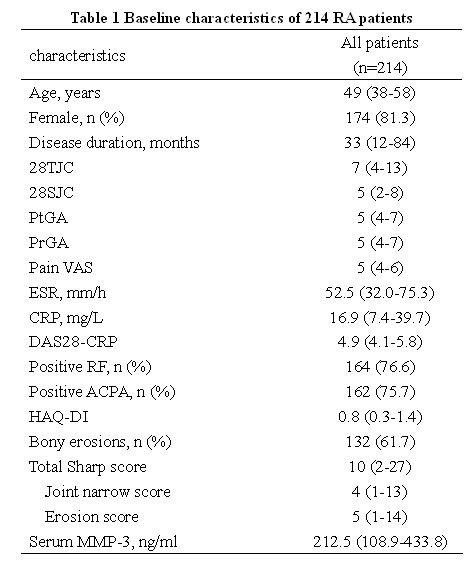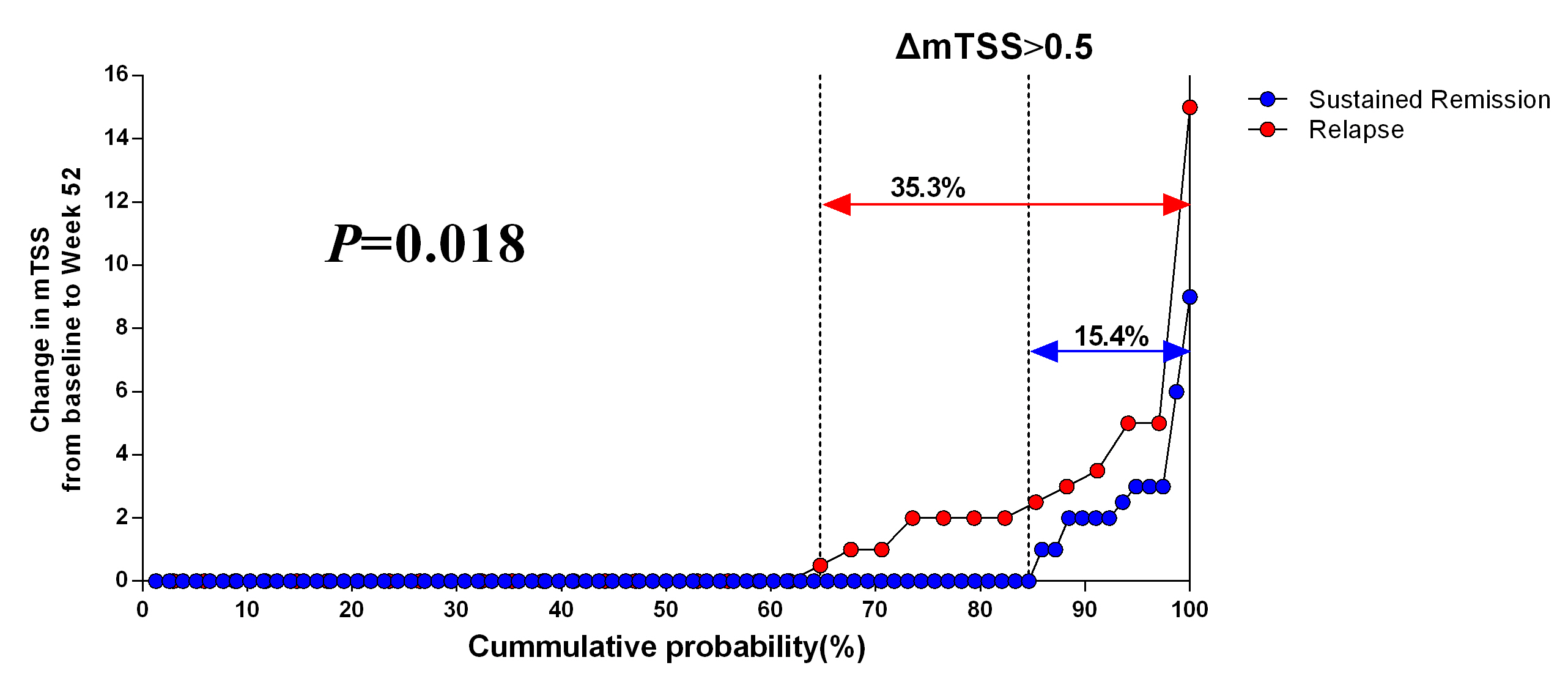Session Information
Date: Monday, October 22, 2018
Title: Rheumatoid Arthritis – Diagnosis, Manifestations, and Outcomes Poster II: Diagnosis and Prognosis
Session Type: ACR Poster Session B
Session Time: 9:00AM-11:00AM
Background/Purpose: Our previous study showed continuously elevated serum matrix metalloproteinase (MMP)-3 predicted one-year radiographic progression (RP) in RA and the cutoff value at 6th month was 161ng/ml (Arthritis Res Ther. 2015). Here we aimed to explore whether elevated serum MMP-3 predicted relapsed in RA.
Methods: RA patients with moderate to high disease activity (DAS28-CRP>3.2) were recruited. Clinical data were collected and serum MMP-3 was detected by ELISA at baseline and each visit (1st, 3rd, 6th and 12th months). The cutoff value of MMP-3 at 6th month was 161ng/ml. RP was defined as modified total Sharp score (mTSS) changed more than 0.5 from baseline to the 12th month.
Results: There were 214 RA patients finished one-year follow-up and 64 (29.9%) showed RP (Table 1). There were 59 (27.6%), 102 (47.7%), 112 (52.3%) and 106 (49.5%) patients reached remission at each visit, respectively. Among 112 patients reached remission at 6th month, there were 30% relapsed at 12th month. Among 102 active patients at 6th month, there were 27% achieved remission at 12th month. Patients who relapsed from 6th to 12th month had significant higher one-year RP than those sustained remission (15.4% vs. 35.3%, P=0.018), accompanied with higher HAQ-DI, PtGA, PrGA and pain VAS at 12th month (all P<0.05). Patients who relapsed from 6th to 12th month had significantly higher CRP [3.1 (3.0~7.0)mg/L vs. 3.0 (3.0~3.1)mg/L], DAS28 [2.0 (1.6~2.3) vs. 1.6 (1.5~2.0)] and the ratio of elevated MMP-3 [19 (55.9%) vs. 26 (33.3%); all P<0.05] at 6th month than those sustained remission. Univariate and multivariate logistic regression showed that elevated serum MMP-3 was a significant predictor of one-year RP after adjustment of sex, age and disease duration (adjusted OR 2.599, 95%CI 1.087~6.216, P=0.032).
Conclusion: Elevated serum MMP-3 at 6th month in remission RA patients may be a useful predicator for relapsed at one-year.
Fundings: This work was supported by National Natural Science Foundation of China (81471597, 81671612), Guangdong Natural Science Foundation (2017A030313576, 2017A030310236), Guangdong Medical Scientific Research Foundation (A2017093, A2017109).
Figure 1 Cumulative probability of change in mTSS among patients who sustained remission or relapse from 6th to 12th month.
To cite this abstract in AMA style:
Chen LF, Ma JD, Wang JW, Xu YH, Yang KM, Lin JZ, Dai L. Elevated Serum MMP-3 in Remission Predicts Relapsed in Patients with Rheumatoid Arthritis [abstract]. Arthritis Rheumatol. 2018; 70 (suppl 9). https://acrabstracts.org/abstract/elevated-serum-mmp-3-in-remission-predicts-relapsed-in-patients-with-rheumatoid-arthritis/. Accessed .« Back to 2018 ACR/ARHP Annual Meeting
ACR Meeting Abstracts - https://acrabstracts.org/abstract/elevated-serum-mmp-3-in-remission-predicts-relapsed-in-patients-with-rheumatoid-arthritis/


